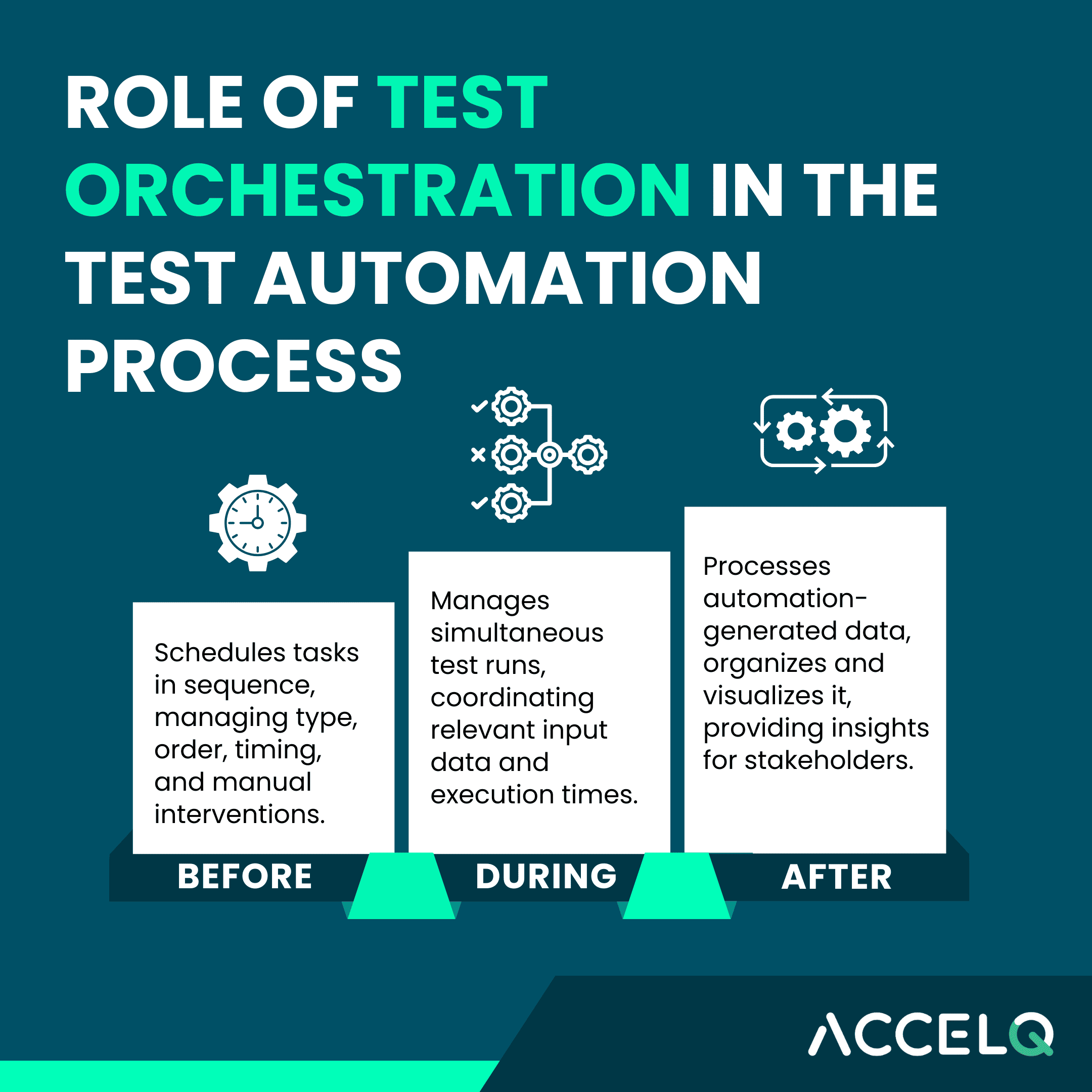Role of Test Orchestration in the Test Automation Process

Test automation is an indispensable aspect of the QA process. But just automation is not enough. As software complexity grows, teams face several new challenges that slow down work and impact quality. This is where test orchestration comes into the picture.
What is Test Orchestration?
Test orchestration is the process of setting up a well-defined sequence of test automation activities. It optimizes the software testing process and eliminates inconsistencies along the way.
- Test orchestration acts as a master test plan that ensures all necessary testing steps are followed. It makes sure that critical tasks do not block each other and minimizes the possibility of human error.
- Test orchestration automates and ties together individual tests. These include individual unit tests, system tests, integration tests, functional tests, and more.
- Test orchestration also ensures the continuous execution of tests. Such automated execution provides a complete picture of the state of different tests in different environments.
What role does it play in test automation?
While automation focuses on individual tasks, test orchestration streamlines the entire process by scheduling all automation tasks in a linear manner. Test orchestration plays a mighty role in the test automation process.
- Before: Test orchestration schedules automation tasks in a sequence. It integrates independently automated tests into a sequential order for execution, managing the type of tests, their order, timing, and any necessary manual interventions.
- During: Once tests are properly scheduled, test orchestration ensures multiple tests are run simultaneously. It manages the relevant input data and coordinates the test execution times.
- After: Following the execution of the testing processes, test orchestration processes data generated by test automation. It processes, organizes, and visualizes this data and reports them to stakeholders. It analyzes test reports to identify both successes and failures, helping teams plan the right remediation steps.
Why is test orchestration crucial?
As software testing gets increasingly complex, test orchestration sets the stage for continuous and effective test automation.
On that note, let’s look at the top benefits test orchestration delivers in the test automation process:
- Optimizes testing: Test orchestration makes testing an integral part of the CI/CD pipeline. It empowers QA teams to discover product issues early in the lifecycle and test code immediately after integration. This allows testers to edit code in real time, thus optimizing testing and speeding up software delivery.
- Eliminates inconsistencies: Test orchestration allows QA engineers to schedule tests based on the risk levels of their application. This means they can build a test automation pipeline to address the risks and issues across the performance, availability, scalability, security, and robustness of the application.
- Fuels communication: Test orchestration establishes convenient and frequent communication between QA and development teams. This allows them to avoid many small errors and release delays.
- Minimizes errors and delays: By minimizing manual intervention in the testing cycle, test orchestration significantly reduces errors and delays. This powers self-sustainability while ensuring fewer execution failures.
- Improves visibility: Test orchestration delivers much-needed visibility into the testing ecosystem. It enables QA teams to identify and address bottlenecks early on, improving software quality and accelerating time to market.
- Maximizes transparency: Since test orchestration establishes the necessary sequence of tasks, it keeps all stakeholders well-informed about the project’s current status. All members get a good insight into individual roles and responsibilities as well as project strengths and weaknesses.
- Enables continuous testing: Testers can use the reports generated by test orchestration to establish common benchmarks. These benchmarks can help determine the next course of action and serve as the foundation of a continuous testing process.
Tips for successful test orchestration
If you want to ensure successful test orchestration, you must ensure proper planning. This minimizes the chances of orchestration negatively impacting the quality of the software under test.
- Build a clear strategy: Test Orchestration is more than just scheduling various test automation tasks. To ensure sustained success, you must first build a clear strategy. This includes establishing a robust test orchestration pipeline, clarifying roles and responsibilities, and listing the intended outcomes. It is also important to document potential hurdles and roadblocks and plan for appropriate remediation.
- Use the right tools: The tool you choose can make or break your test orchestration success. Therefore, it is important to spend time assessing the capabilities of different tools and choosing one that best fits the needs of your business and the nuances of your application.
- Measure and monitor: Successful test orchestration also demands continuous monitoring. By measuring progress and analyzing outcomes, you can ensure the orchestration pipeline delivers its best value.
How ACCELQ can help
As test orchestration becomes ever more important; a platform like ACCELQ offers exceptional benefits.
- With ACCELQ’s codeless capabilities, QA teams can rapidly initiate test orchestration. They needn’t spend time setting up the orchestration pipeline or executing tests. The platform does all this in an automated manner, allowing teams to focus on the more crucial aspects of testing.
- ACCELQ’s powerful orchestration engine orchestrates data flows, offering teams the fluidity to develop automation scenarios. It significantly streamlines the scenario development process, allowing for the creation of complete end-to-end tests with zero prerequisites.
- ACCELQ’s built-in AI features automate test executions, supporting the entire enterprise application portfolio. It seamlessly handles new and evolving technologies and offers out-of-the-box support for complex and dynamic test automation elements.
Wrapping Up
In the world of test automation, teams need to constantly drive efforts to enhance product quality and delivery. Test orchestration plays a crucial role in streamlining and optimizing the test automation process. It properly times and schedules test automation tasks and also ensures their correct execution. It also helps teams better analyze test data and make the right data-driven decisions.
Planning to transform your test orchestration approach? Here’s how ACCELQ’s test automation platform can help improve visibility, eliminate inconsistencies, and build the foundation of continuous testing.
Balbodh Jha
Associate Director Product Engineering
Balbodh is a passionate enthusiast of Test Automation, constantly seeking opportunities to tackle real-world challenges in this field. He possesses an insatiable curiosity for engaging in discussions on testing-related topics and crafting solutions to address them. He has a wealth of experience in establishing Test Centers of Excellence (TCoE) for a diverse range of clients he has collaborated with.
Discover More
 Test Automation Framework: Definition, Types, Pros, and Cons
Test Automation Framework: Definition, Types, Pros, and Cons
Test Automation Framework: Definition, Types, Pros, and Cons
 What is Desktop Automation? A Brief Guide
What is Desktop Automation? A Brief Guide

































